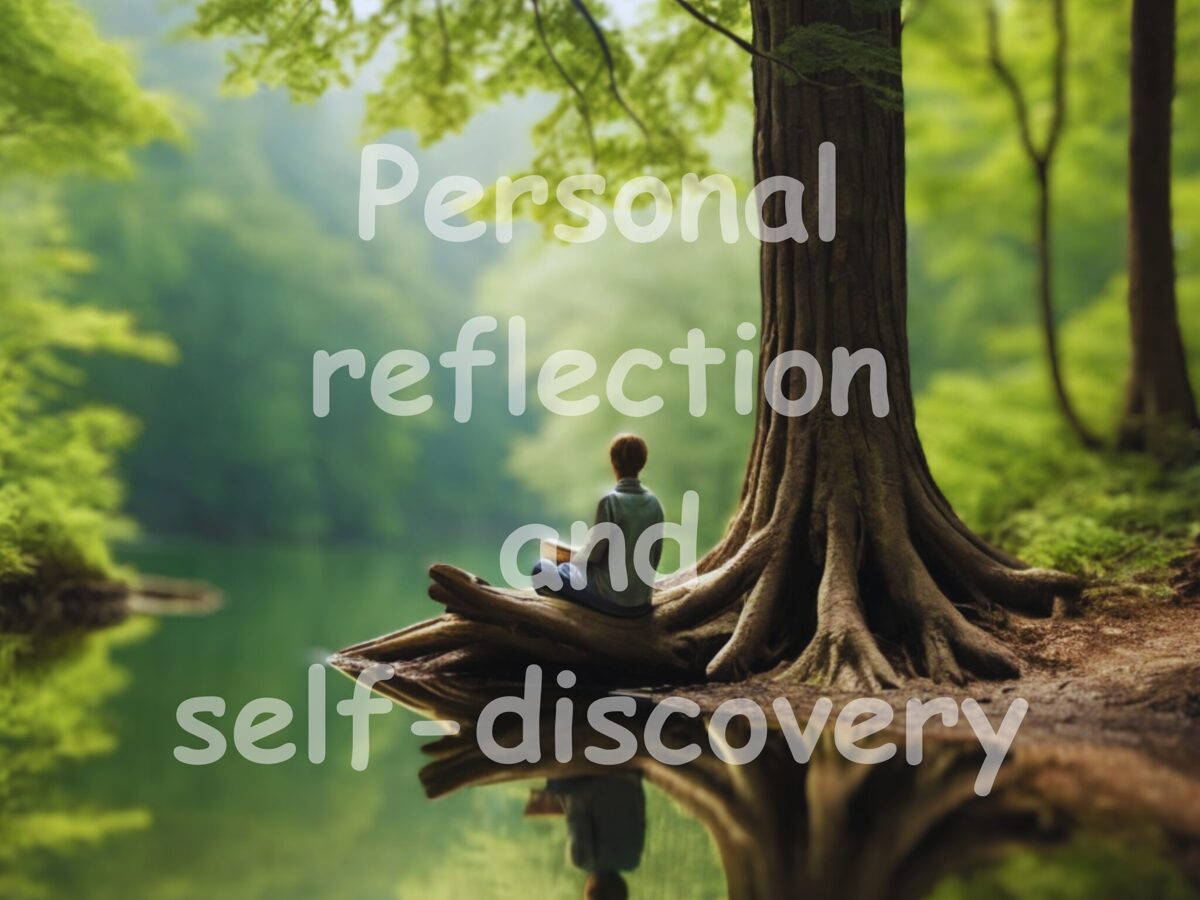Personal reflection and self-discovery: A journey inside
Releasing the power of self-awareness
Self-reflection and self-knowledge are fundamental elements for one’s own growth and personal development.
They require self-analysis to understand their thoughts, feelings and attitudes, leading to greater self-awareness.
This path of self-discovery can be revolutionary, supporting individuals in making informed choices, consolidating deeper bonds and achieving their goals.

What is self-reflection and self-discovery?
Personal reflection is about analyzing your thoughts, emotions and experiences in order to gain greater self-awareness. It requires personal reflection and self-analysis that enable people to recognize their strengths, vulnerabilities, core values and beliefs. The emergence of one’s own identity, on the other hand, comes from an inner meditation. It is a path that allows you to reveal new insights about yourself, leading to greater personal awareness.
Self-reflection and the process of self-discovery can manifest itself in many ways, such as in diaries, meditation practices, therapy sessions and personal assessment tools. These activities support people in investigating their inner selves, recognizing patterns in their behavior, and gaining a deeper understanding of their motivations and aspirations.
The uses of self-reflection and self-discovery
- Individual evolution and improvement: Individual reflection and self-exploration are fundamental to personal growth and progress. With increased self-awareness, people can recognize their own areas of growth and set goals for their personal progress. This self-awareness enables them to make informed choices, face challenges and achieve their goals.
- Improvement of the decision-making process: Self-awareness enhances the ability to make decisions. When people recognize their values, beliefs and what they consider important, they are able to make decisions that reflect their true identity. This harmonization leads to greater happiness and personal fulfillment in life.
- Strengthened bonds: Personal meditation and self-discovery are essential to creating and sustaining healthy relationships. By understanding their emotions and actions, people can develop greater empathy towards others and improve their communication. This self-awareness encourages deeper and more meaningful relationships with friends, family and colleagues.
- Stress management and emotional health: Personal reflection can support people in managing stress and enhancing their emotional well-being. By recognizing and managing negative thought patterns and emotions, people can create coping strategies and strengthen their resilience. This self-awareness is essential to preserving mental health and overall well-being.
- Professional development: In the work environment, introspection and self-discovery are of fundamental value. Recognising one’s strengths, weaknesses and career goals can help people choose the right career path and look for opportunities that reflect their skills and passions. This self-awareness is essential to achieving career success and feeling satisfaction in the job.
- Expressing your creativity: Self-knowledge often frees your creativity. By analyzing their inner selves, people can discover their distinctive abilities and passions, which translate into different forms of creative expression, such as art, writing or music. This self-knowledge promotes personal growth and a sense of purpose.
Conclusion
Introspection and self-discovery are effective tools for personal improvement and individual growth. Through introspection and self-analysis, people can gain a deeper knowledge of themselves, which leads to more informed decisions, stronger relationships and improved emotional well-being.
Whether you use a diary, meditation, therapy or self-assessment tools, the path to self-discovery is a transformative experience that allows people to lead more satisfying and meaningful lives.
Take advantage of the importance of inner reflection and start a journey of self-exploration to reveal your true potential.
To Be Happy, You Need: Essential Ingredients for a Fulfilling Life
Seeking happiness every day
We all wish to be happy, but often finding a definition and achieving a true sense of happiness can seem difficult.
Although specific characteristics may differ from individual to individual, there are common elements that contribute to a feeling of well-being and satisfaction.

- Gratitude: Gratitude consists of recognising and appreciating the positive aspects of our existence. Research has shown that people who regularly practise gratitude exercises experience an increase in happiness, optimism and satisfaction in life. To practise gratitude, I suggest you create a daily diary in which you note down 3 items for which you are grateful or express your thanks to loved ones and friends.
- Important relationships: People are social beings, prone to making connections and seeking a sense of belonging. The importance of having good connections with one’s family, friends and community is fundamental to our overall well-being and psychological health. Spend time and effort to build deep relationships by participating in activities that promote trust, empathy and mutual understanding. This may include volunteering or joining associations, attending social occasions, or just reaching out to someone for an informal chat.
- Goal and Passion: Having a goal or passion provides us with direction, drive and gratification. When we align our actions with our values and passions, we generate a sense of fluidity and dedication that brings about a significant improvement in our existence. Identify what motivates you, be it an interest, a professional goal or a personal mission, and commit to pursuing it. Even if you take small steps to get closer to fulfilling your passions, you will experience great happiness and fulfilment.
- Mindfulness and self-awareness: The practice of mindfulness involves being aware of oneself, observing and accepting what is happening in the present moment without making judgements or evaluations. By focusing our attention on our thoughts, emotions and perceptions, we achieve greater awareness of ourselves and our needs. Studies indicate that the habitual adoption of mindfulness techniques, such as meditation, yoga or deep breathing, can help decrease stress levels, anxiety and depression while increasing emotional well-being and compassion for oneself.
- Well-being and physical health: To ensure one’s happiness in both the short and long term, it is essential to devote oneself to taking care of one’s body and maintaining physical health and well-being. The constant practice of physical activity, adoption of a balanced diet, adequate rest and regular medical check-ups are essential to foster mental well-being, increase vitality and improve health overall. In addition, dedicating oneself to personal well-being through relaxation practices, massage or other pleasurable activities promotes balance and the ability to cope with the difficulties that life throws at us.
- Resilience and growth mindset: Resilience and growth mindset are 2 important aspects of our ability to face obstacles and remain optimistic even in the face of difficulties. Resilience refers to our ability to recover from adverse situations, while growth mindset indicates our propensity to see obstacles as opportunities to learn and develop new skills. Despite setbacks, we maintain a positive attitude and remain flexible in dealing with adversity. By developing a mindset of progress, believing that our skills can improve through commitment and dedication, we are able to approach difficulties as opportunities to learn and develop. Accepting failure as part of the journey, rather than seeing it as a sign of inherent futility, fosters determination, imagination and adaptability.
- Generosity and altruism: Helping others not only benefits those in need, but also has a significant impact on our personal joy and well-being. Engaging in kind gestures, voluntary activities or contributing resources triggers the brain areas related to pleasure and gratification, resulting in the perception of greater happiness and well-being. In addition, giving increases integration between people and generates a feeling of connectedness that enriches our existence.
Conclusion
Although happiness can take different forms for everyone, integrating these fundamental elements into one’s life can foster a path to a fuller and more satisfying existence.
One must keep in mind that cultivating one’s happiness is an uninterrupted journey that requires patience, dedication and the ability to look within oneself.
By following a path that includes exercising gratitude, cultivating meaningful relationships, identifying purpose and passion, developing mindfulness, nurturing physical health, resilience and practising generosity, you can embark on a path to a happier life.
